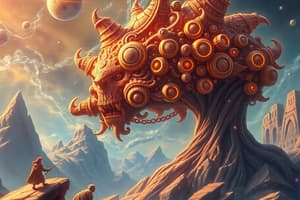Podcast
Questions and Answers
ଏହି ପାଠରେ ମୋଡାଲ ଲୋଜିକ୍ କେତେ ଧରଣ ରେ ଭାସ ହୋଇଛି?
ଏହି ପାଠରେ ମୋଡାଲ ଲୋଜିକ୍ କେତେ ଧରଣ ରେ ଭାସ ହୋଇଛି?
- 5
- 4
- 3 (correct)
- 2
ମୋଡାଲ ଲୋଜିକ୍ ର ସୂଚନା 'Necessarily P' ଏତେ?
ମୋଡାଲ ଲୋଜିକ୍ ର ସୂଚନା 'Necessarily P' ଏତେ?
- oxplus Q
- oxplus S
- oxplus R
- oxplus P (correct)
ଯେ ପ୍ରସଂଗ 'Possibly P' ସୂଚିତ, ସେ ସୂଚନା କେତେ ?
ଯେ ପ୍ରସଂଗ 'Possibly P' ସୂଚିତ, ସେ ସୂଚନା କେତେ ?
- oxplus S
- oxplus P
- oxplus R
- oxplus Q (correct)
Modal logic ସୂଚନ୍ , ୟ/ ୟ oxplus P ସSyntax ସ ?
Modal logic ସୂଚନ୍ , ୟ/ ୟ oxplus P ସSyntax ସ ?
'All' ସ ସୂଚক ସ, Syntax ସ ?
'All' ସ ସୂଚক ସ, Syntax ସ ?
'There exists' ସ ସୂচক ସ, Syntax ସ ?
'There exists' ସ ସୂচক ସ, Syntax ସ ?
କେଉଁଠି ସଠି ସଠି?
କେଉଁଠି ସଠି ସଠି?
Modal Logic କ'ଣ ସ'ହ ପ'ୱ' ସ'ୱ'?
Modal Logic କ'ଣ ସ'ହ ପ'ୱ' ସ'ୱ'?
Modal claims କ'ଣ ସ'ଁ ପ'ৱ' ସ'ୱ'?
Modal claims କ'ଣ ସ'ଁ ପ'ৱ' ସ'ୱ'?
Computer science ରେ Modal logic କ' -?
Computer science ରେ Modal logic କ' -?
Modal logic Semantic interpretations କ' -?
Modal logic Semantic interpretations କ' -?
'Systems include T_{n} and B_{n}' phrase-টি Modal logic-র উৎপত্তি হৈছে?
'Systems include T_{n} and B_{n}' phrase-টি Modal logic-র উৎপত্তি হৈছে?
Flashcards are hidden until you start studying
Study Notes
Modal Logic
Modal logic is a type of symbolic logic that deals with necessity and possibility. It addresses how certain statements can be proven to be necessary or impossible within a given system of knowledge. Here, we'll explore the basics of modal logic, including its applications and key ideas.
History and Foundations
The concept of modality, which refers to the distinction between what is necessary or contingent, dates back to ancient Greek thought. Aristotle's discussions of necessity and possibility foreshadow modern modal logic. Early developments in modal logic were influenced by medieval scholastics and 17th century discussion of necessity. However, the modern field began to develop in earnest in the early 20th century due to the work of C.I. Lewis, G.E. Moore, and others.
Key Ideas and Notations
Modality is often represented using boxes ((\boxplus)) for necessity and diamonds ((\lozenge)) for possibility. Necessarily (P) ((N(P))) is denoted (\boxplus P), while possibly (P) ((M(P))) is denoted (\lozenge P). Modal logic also involves the use of quantifiers to express generality; the universal quantifier, denoted (\forall), represents 'all', and the existential quantifier, denoted (\exists), represents 'there exists'.
Modal Systems and Semantics
There are several distinct modal systems, each with varying strengths and weaknesses. Examples include the basic system (S_{n}) (denoting necessity) and (K_{n}) (denoting possibility). More advanced systems include (T_{n}) and (B_{n}). Within these systems, semantic interpretations are crucial for understanding the meaning of modal claims. For instance, a common interpretation assigns truth values to sentences depending on whether they are true in all possible worlds (necessary) or true in at least one possible world (possible).
Applications of Modal Logic
Modal logic is applicable across numerous areas. In deontic logic, it concerns moral obligations, rights, and permissions. Epistemic logic focuses on knowing and belief, whereas temporal logic handles the passage of time. Additionally, modal logic plays a role in computer science and the foundations of mathematics. In computer science, it helps validate designs for digital circuits, while in mathematics it supports the consistency and independence of axioms.
In summary, modal logic is a versatile tool that allows us to reason about necessity and possibility within a wide range of contexts. Its systematic approach, grounded in rigorous symbolic notation and semantics, enables clear, structured discourse about philosophical issues and practical problems alike.
Studying That Suits You
Use AI to generate personalized quizzes and flashcards to suit your learning preferences.




